The Seychelles Broadcasting Corporation (SBC) is the National Public Broadcaster of the Republic of Seychelles.
What we Broadcast
The SBC owns and operates 3 Television channels, SBC1, SBC2 and SBC3 and 2 radio services: Radyo Sesel & Paradise FM.

SBC1 is the flagship channel
providing a balanced programming schedule, catering for all of the SBC’s mandates and genres and providing first runs for most programmes

SBC2 is aimed at catering mostly for the entertainment and educational part of the SBC mandate. It is dedicated to Archived Programmes, live broadcast of the National Assembly sessions and live Outdoor Broadcasts including key sporting events.

SBC3 is primarily a special events channel which broadcasts live events such as press conferences. It also carries reruns of other live content aired originally on SBC1 and SBC2.
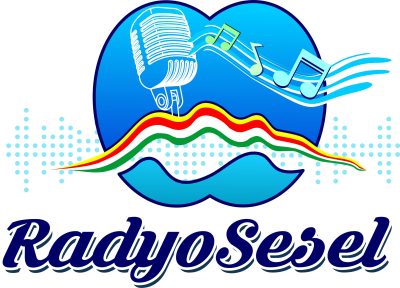
Radyo Sesel targets a general and mature audience. Up until November, 2022, Radyo Sesel was only available as an AM Service on 1368 kHz (219 metres). Following an extensive infrastructural upgrade, Radyo Sesel service is now available on the following FM frequencies. St. Louis – 99.4 MHz; Anse Soleil – 94.2 MHz; Baie Ste Anne – 106.6 MHz and Fairyland – 91.5 MHz.

Paradise FM was launched in May 1997 as a music station, more oriented towards the youth and also broadcasts 24 hours a day.
We also broadcast free-to-view international television services on our DTT platform, namely; Al Jazeera, Deutsche Welle, TV5 Monde Afrique, TiVi5, TV5 Lifestyle, CGTN NEWS, CGTN Français, and France 24.
The SBC also has the responsibility of relaying 2 international radio stations namely Radio France International (RFI) and British Broadcasting Corporation (BBC World Service) on FM.
Governance
The SBC is guided by Article 168 of the Constitution which makes provision for a State-funded but Independent broadcasting corporation.
- The State shall ensure that all broadcasting media which it owns or controls or which receive a contribution from the public fund are so constituted and managed that they may operate independently of the State and of the political or other influence of other bodies, persons or political parties.
- For the purposes of clause (1), the broadcasting media referred to in that clause shall, subject to this Constitution and any other law, afford opportunities and facilities for the presentation of divergent views.
The SBC Act 2011 establishes SBC as an independent body corporate administered by a board of directors, appointed by the President of the Republic. In 2017, amendments to the SBC Act (SBC Amendment Act 2017) changed the manner in which board members were appointed. The 2017 amendment also introduced the post of Deputy CEO.
The SBC is governed by an independent Board of Directors…
The SBC Board of Directors is made up of a Chairperson, a Vice-Chairperson and seven members:
- Gérard Lafortune (Chairperson)
- Ms Marie Anette Ernesta (Vice-Chairperson)
- Ms Evelina Antha
- Mr Ralph Lablache
- Mr Audric Govinden
- Mrs Joana Nicette
- Mr Michel Pierre
- Mrs Marion Gendron
- Mr Harry Tirant
The CEO, Deputy CEO and the Elected Staff representative are ex-officio members of the SBC board.
…and managed by a passionate executive team.
The SBC’s Executive is headed by the Chief Executive Officer, assisted by a Deputy Chief Executive Officer. Both executives were appointed following recommendations made by the SBC Board to the President, who in turn, consulted with the Speaker of the National Assembly and the Chief Justice, as per the stipulations of the SBC Act.
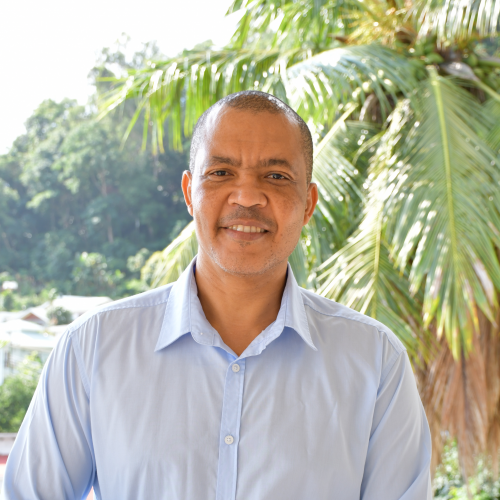
Chief Executive Officer
Bérard Duprès
He holds a Bachelors degree in Telecommunications and Electronic Engineering from the University of Bath in UK. He is also a Member of the Institute of Engineering and Technology (UK) and a member of the Chartered Management Institute (CMI).
Bérard has worked as the Senior Local Manager at the BBC Atlantic Relay Station on Ascension Island in the South Atlantic and has also served as manager of the BBC Indian Ocean Relay Transmitting Station, at Grand Anse Mahé, while at the same time administering two radio transmitting stations in the United Arab Emirates.
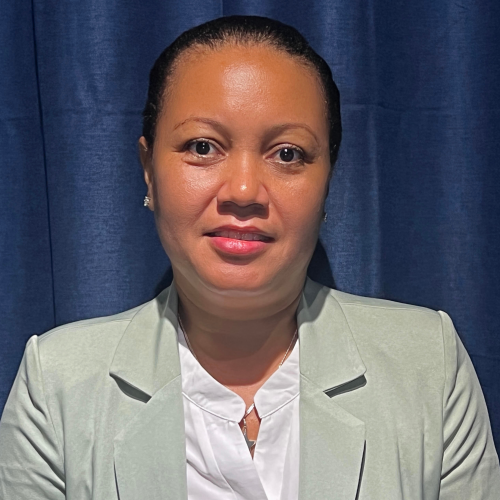
Deputy Chief Executive Officer
Cindy Wirtz
From 2003 to 2005, she was an executive member of the Commonwealth Journalist Association (CJA) representing East Africa and in February 2003, she attended the CJA Jubilee Conference in Bangladesh.
Cindy has been trained in reporting gender violence and she also attended the Beijing +5 Gender Conference in New York in the year 2000. She has also been trained in parliamentary reporting and was at one point, the main parliamentary reporter for SBC.
After a break of 3 years, whereby she worked in a bank in communication and marketing, she returned to the SBC in 2010 in her new capacity as the Sales & Marketing Manager, now Head of Marketing and Corporate Affairs.
Cindy has a Professional Diploma in Marketing from the Chartered Institute of Marketing (CIM) and is also a Member of CIM. She also has a Diploma in Leadership and Strategic Management from the Brighton School of Business and Management.
Cindy loves reading and traveling.

Head of Human Resource and Administration
Doreen Arnephy
Mrs Arnephy holds a bachelor’s degree in education from the Edith Cowan University, Perth, Western Australia. In 2017, she was awarded a master’s in public administration following successful completion of a degree programme with the Eastern and Southern African Management Institute (ISAMI) Tanzania, and the University of Seychelles.
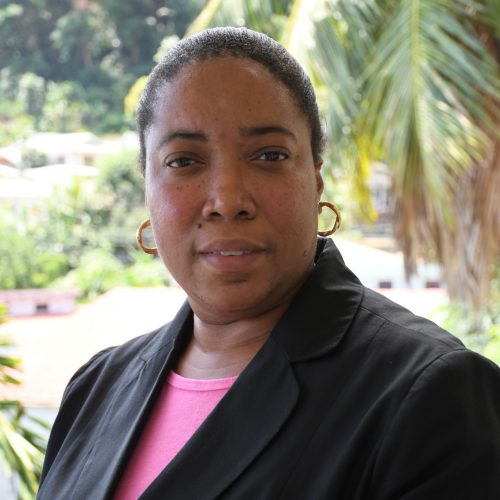
Head of Finance
Denise Horace
Denise holds an International Award in Accountancy with the Association of Accounting Technicians and has been a member of this association for 10 years. She had attended short courses in Broadcast Management, Talent Management & Succession Planning and Project Management. Denise is still pursuing her studies to become an ACCA Affiliate.
The main role as the Financial Controller is to oversee the financial aspects of the organization, to ensure that ensure that all financial decisions taken are in line with financial instructions and regulations. She has ensure that the SBC budget is well managed which has not been an easy task. Despite all the challenges she faces she enjoys her work and lead a very young Finance Team.
Denise has a pleasant personality always finding ways to cheer others. She likes listening to music and reading.
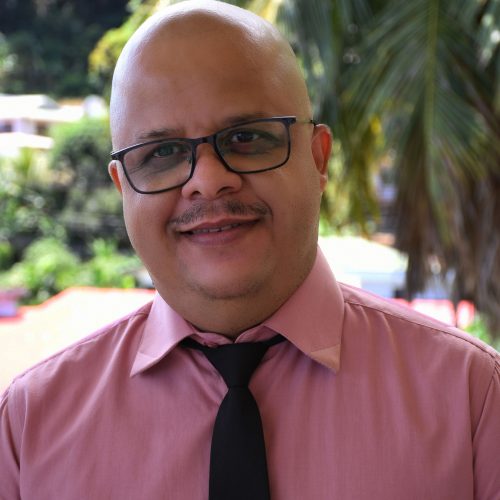
Head of Marketing, Multimedia and Corporate Affairs
Derrick Young-Khon
Mr.Young–Khon is a BBC trained radio presenter/producer and holds a Bachelor’s honour’s degree in Media & Communications from the University of Central England in Birmingham, UK.
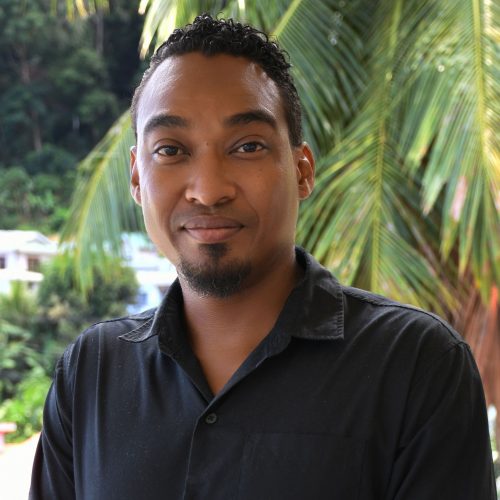
Head of Engineering & Technology
Hervé Cherry
He started his career in broadcasting at the BBC Indian Ocean Relay Station. During his career he has worked on a few overseas sites. He also has proven experience in IT, power engineering and electronics.
Mr. Cherry has a Higher National Diploma (HND) in Electronic Engineering and has also attended several courses related to the engineering field.
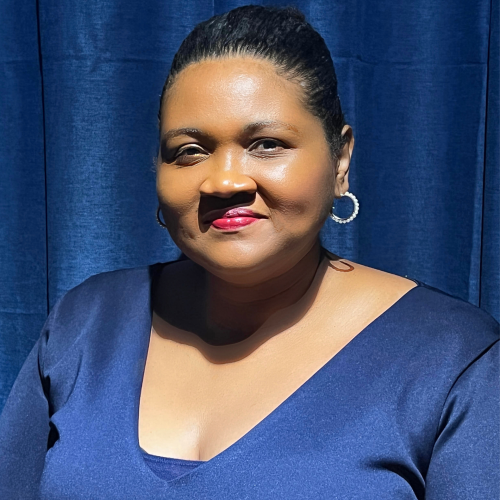
Head of News, Current Affairs and Sports
Marie-France Racombo
In 2020, she was promoted to the post of Principal Editor, a position she held until her appointment as the Head of News, Current Affairs and Sports in December 2021.
Ms Racombo holds an Advanced Diploma in Teacher Education from the National Institution of Education specialising in teaching at Secondary level.
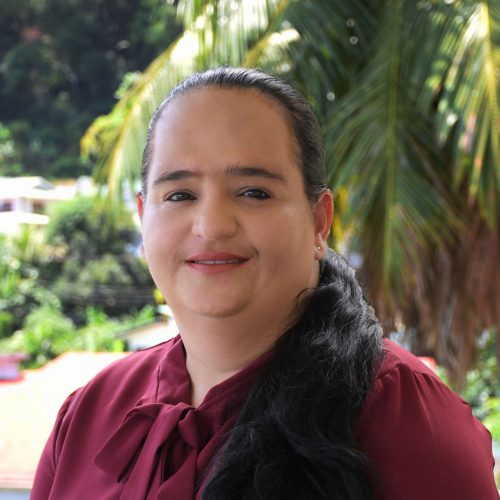
Head of Radio Programmes
Nathalie Rose
Nathalie has been passionate about radio since childhood. She believes that the medium can work magic in one’s life.
Nathalie has over 20 years of continued experience with the SBC. She started off as a Radio Producer with Radyo Sesel in 2002. She eventually moved on to Paradise FM to share her experience and talent on the airwaves through her radio alter ego ‘Nathalie Chocolat’.
As a radio producer Nathalie has produced different genres of programmes and hosted different shows on both Radyo Sesel and Paradise FM. ‘Kouler Tropik’ and the Sunday ‘Un Nouveau Jour’ are two of her ongoing and much appreciated shows.
Since joining SBC, Nathalie has followed several trainings relating to radio. These include a short diploma course in radio production in 2004 with the International Institute of Journalism in Berlin; a short course in radio continuity with Conseil International des Radios-Télévisions d’Expression Française (CIRTEF) in 2005 and a distant learning certificate in Radio Journalism with the Commonwealth Broadcasting Association from 2006 to 2008.
Nathalie believes that one should never stop learning and always aim higher. She took the opportunity to hone her journalism skills from 2010 through to 2011, by pursuing a certificate in Journalism course with the then Seychelles Institute of Management. In 2013, she attended the Radio Netherlands Training Centre (RNTC) to train as a trainer specialising in radio production.
She self-funded her 3-year Diploma in General Management course with the University of Seychelles. In 2018 she graduated with a distinction and was also conferred the Best performer award in her cohort.
As the Head of Radio Programmes, Nathalie is responsible for SBC’s radio stations, Radyo Sesel and Paradise FM. She values good teamwork and the delivery of high-quality output. Her motto is “a committed workforce must understand that change is desirable and the magic wand for success”.
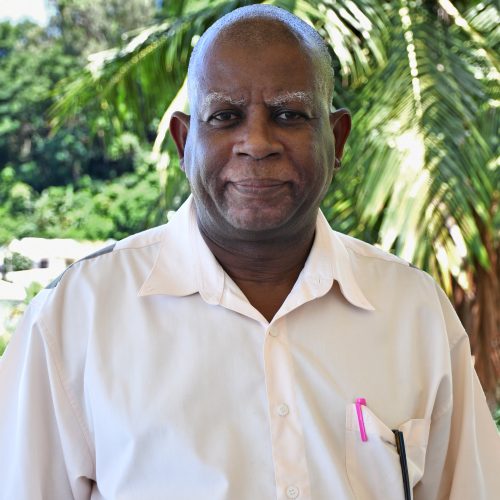
Head Of Support Services
André Andimignon
He started his career as an Electronic Technician with the Far East Broadcasting Association (FEBA). From 1982 to 1994, he worked as a Sound Technician with then Radio Television Seychelles (RTS) which subsequently became SBC. He transferred to the International Conference Centre (ICCS) to work as a Technical Officer until 2007 when he re-joined SBC.
Mr. Andimignon has a Certificate in General Management, International Certificate in Logistics and Transport and Diploma in Logistic & Transport.
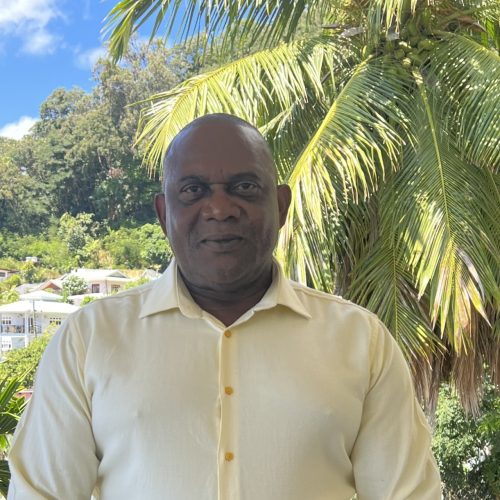
HEAD OF TV PROGRAMMES
Jérôme Dogley
In 1993, he was promoted to the position of TV Producer, a role he occupied for seventeen years. His experiences and skills in this role allowed him to be further promoted to Manager for TV Production in 2010, a position he has held until his appointment as the Head of TV Programmes on the 21st August 2023.
Throughout his employment, Mr. Dogley has attended various trainings and acquired a wealth of knowledge and skills in television productions and broadcast management.
There are 8 sections within the functional structure of SBC.
The final outputs which our audience hears and views on the air is a result of the concerted efforts of these different sections.
News, Current Affairs & Sports
Radio Programmes
Television Programmes
Operations and Support Services
Marketing , Multimedia & Corporate Affrairs
Human Resources & Administration
Finance
Engineering and Technology
Our historic milestones
Public broadcasting in Seychelles dates from 1945 with a daily one-hour broadcast run by the Department of Education, using the facilities of the Cable and Wireless telecommunications company.
Radio Seychelles proper first came on the air from a studio at Union Vale.
Eric Passmore was appointed as Manager of Radio Seychelles.
An announcer, Gilbert Confait, and a technician, Dawson Sinon, were employed on a full time basis, while two other persons were employed on a part time basis, Emmy Etienne as announcer and Davidson Chang-Him as technician.
The appointment of a manager brought additional development. Broadcasting time was increased to four and a half hours on weekdays.
Local news items and announcements were broadcast in English and Creole. New programmes were also introduced, such as local advertising in both languages, a programme of lunch time music and another focusing on items of interest to the Creole-speaking listeners which was broadcast late in the evening.
Outside broadcasts started on the occasion of the opening of the National Show by the Governor. Religious services, choral singing and sports commentaries were also broadcasted.
With the installation of a new Marconi transmitter, Radio Seychelles operated in a medium wave band on a 1 kilowatt power output, transmitting for four and a half hours daily in the three languages, English, French and Creole.
The new equipment resulted in an improvement in both range and quality. Most of the programmes continued to be provided by the BBC Transcription Service. Other programmes were produced locally or sent by international broadcasting organisations.
The staff consisted of a British manager/engineer on I.V.S. Volunteer and six full-time and six part-time local staff.
On Sunday 30th May 1971 at 1.15 a.m an explosion occurred at Radio Seychelles at Union Vale which totally destroyed the transmitters. Damage was estimated at half a million Seychelles rupees. The explosion was caused by a demolition charge placed on the premises.
Radio Seychelles received its first outside broadcasting van which made it possible to introduced live programmes such as tea time music.
The programmes were hosted by different announcers like Douglas Cedras, Jeris Moses and Marie-Cécile Medor, from various places around Mahé.
That same year the hours of broadcasting were extended to 65 hours per week.
A survey was also conducted to inquire about the listening habits and opinions of the listeners of Radio Seychelles.
A television unit was set up at Bel Eau to produce video programmes for the Ministry of Education.
Public television was launched with Radio Television Seychelles (RTS) broadcasting from Hermitage every weekend (Friday to Sunday).
By 1986 television programmes were available to some 98% of the population.
RTS television began broadcasting seven evenings a week.
With the installation of a new satellite dish at the TV station at Hermitage two years later, viewers were able to watch CNN relayed by RTS.
Following the re-introduction of multiparty politics, RTS (a government station run by the Ministry of Information) became the Seychelles Broadcasting Corporation (SBC), a public broadcasting service.
Paradise FM, the FM radio service of the SBC, was launched to complement the AM radio service.
The SBC TV revamped its programming with a stronger focus on locally-produced programmes. This saw the introduction of its seasons-based local production programming and its 24-hour service due to coming on line of its Automated On-Air Playout system.
The SBC Act was amended and a new SBC Board of directors was appointed two months later.
A new CEO and Deputy CEO was appointed by the President following the recommendation of the SBC Board.
The Radio Station at Union Vale was demolished to pave the way for the construction of the new SBC House. The Radio team was relocated to the main SBC headquarters at Hermitage.
SBC TV went digital with 10 TV channels and 4 radio channels on its free-to-view bouquet.
Radyo Sesel started 24-hour broadcast using a radio control system software allowing advanced programming for longer periods.
SBC launched its framework for purchasing local contents from independent producers to complement in-house productions and nurture Seychellois talents in the field of TV and Radio productions.
The first edition of the annual SBC’s Paradise FM Music Awards was held to reward artists who topped the charts in the popular weekly show ‘Paradise FM Chart Attack’.
The SBC analogue TV service which had been in operation since the introduction of public television in Seychelles in January 1983 was officially 'switched-off' completing SBC’s digital switchover process.
SBC provided comprehensive coverage of the 2020 Presidential and National Assembly elections including making history by hosting the country’s first ever Presidential live debates on the 9th and 16th October.
SBC started the implementation of its Policy on Airtime Quota for Political Parties which gave registered political parties a quota of 13 minutes per month for a TV and a radio programme.
Radyo Sesel became available as an additional audio channel on local commercial television platforms thereby reaching a wider audience.
SBC launched ‘Leko’, its new Audio-on-Demand service available via the Radyo Sesel and Paradise FM mobile applications.

